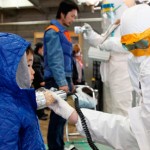Nuke Critic: U.S. Has 23 Fukushima-Type Reactors
 Could a Japanese style nuclear disaster happen in the United States?
Could a Japanese style nuclear disaster happen in the United States?
Could a Japanese style nuclear disaster happen here? There are currently 23 GE nuclear plants currently operating in the United States with a design that is identical to the Japanese Fukushima Daiichi installation which has been in the news. Even more troubling, many of the plants are operating past their intended 40-year operating life. This is only one of the many concerns of Henry Sokolski, the Executive Director of the Nonproliferation Policy Education Center.
Sokolski’s advice for those concerned about Japan’s apparent nuclear failure is to slow down, expect the worst, and be willing to reconsider everything. In an interview with FrumForum, Sokolski emphasized that no one can possibly know yet the extent of the destruction that will be caused by the Fukushima crisis.
Sokolski has problems with both the optimists and the pessimists. He blamed media outlets and pro-nuclear politicians for jumping quickly to calm the public and hide the potential scope of the disaster. “Here in Washington, there’s lots of spinning going on. The New York Times was trying to downplay this before… but they’re not anymore,”
He also pointed out that it is still too early to compare it to a disaster such as Chernobyl, “Does it have to be Chernobyl to be important? We’ve had three explosions in three days.” Sokolski added, “It’s not Chernobyl, but it’s no Three Mile Island either.”
The scope of the disaster can't be understated. Even the American military has taken action in response to the disaster. As of Tuesday morning, radiation dosage levels around the plant had been reported as high as 400 millisieverts per hour. A dose of 400 millisieverts per hour is generally adequate to induce mild (relatively speaking) radiation sickness after less than two hours of exposure. Sokolski noted to FrumForum that the US Navy’s aircraft carriers, which had been sent to help, had been repositioned to 100 miles offshore, ostensibly to avoid radiation danger to the sailors on board the (nuclear-powered) vessels.
Sokolski had the most to say about the potential policy implications of the Fukushima disaster, telling FrumForum that even pro-nuclear advocates are taking a collective breath about the future of nuclear power. “Everyone’s going to have to review stuff – even Lieberman’s taking a second look,” Sokolski said. He related the story of a Republican congressman who confided in him that “it’s not clear” that the House GOP caucus would still be supporting President Obama’s plan for the expansion of the American nuclear energy program, an outcome which was previously a foregone conclusion.
It is unclear how much the Japan disaster is attributable to “acts of God” and how much can be laid at the feet of “operator cock-up.” (Sokolski added that it’s increasingly looking like both.) However, there are still changes to its energy policy that America should take.
Sokolski is set to testify on the Hill on Thursday on nuclear export regulations. The US needs to make sure that anybody to whom it sells nuclear technology must be able to safely operate it. He warned that until the disaster, the US government was preparing to sell nuclear energy technology to the governments of both Jordan and Saudi Arabia, neither of which possesses adequate operational expertise.
Sokolski also quoted approvingly a speech given by John Rowe, the CEO of Exelon Energy (a large electrical utility provider), at the American Enterprise Institute. In the speech, Rowe said that of all the various problems facing the United States, energy is the one where the government would do good if it would just get out of the way, cease picking winners and losers with subsidies and taxes, and “stop telling us how to boil water.”
If nuclear power turns out to be what a fair, free market considers the best way to boil water and turn a turbine, then so be it, said Sokolski. But one gets the sense that, in the aftermath of the Fukushima Daiichi disaster, Sokolski wouldn’t bet on it.
Follow Shawn on twitter: @shawnfs33
Tweet